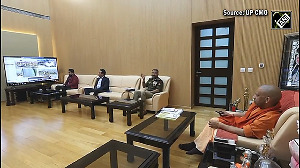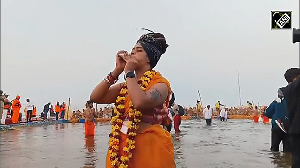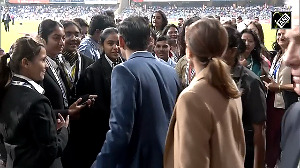The Telecom Dispute Settlement and Appellate Tribunal on Monday ordered the government to make available all the documents that led up to the government's change of policy allowing fixed-line operators to offer limited mobile services.
The TDSAT passed the order in a hearing on the case filed by the cellular service operators earlier this year challenging the government's decision to allow limited mobile services.
The order was delivered by Justice D P Wadhwa after Solicitor-General Kirit Raval made a plea for making all the documents available to the Bench, but not to the opposing counsel of the cellular service operators.
The TDSAT rejected the government's plea that some of these papers were 'privileged' documents and therefore could not be made public except to the Bench.
Wadhwa said, "We're not agreeing to your request for privilege," and that the written order would be available on Tuesday. He added that the government would get a day to decide how it wanted to respond to it. Raval argued that even the Right to Information Act said that notings of bureaucrats on a file should not be made public.
Raval said if this was done, bureaucrats would not feel free to voice their opinions. Opposing counsel Ghulam Vanvati argued that the cellular service operators needed to know why the government had changed its policy on limited mobile phones, and that the documents they wanted the government to make public would shed light on this.
On September 17, 1999, for instance, the Department of Telecom told the Telecom Regulatory Authority of India that limited mobility was not allowed.
On February 2, 2000, the Bharti group was told it could not use limited mobile handsets. Yet on October 9, 2000, DoT told Trai that the Telecom Commission had made a recommendation allowing the use of such handsets.
The government did not say what action it would take. Telecom secretary Vinod Vaish chose not to comment on the matter despite leaving a message at his office.
Reliance Infocomm lawyer Kapil Sibal said he was sure the government would appeal against the order at the Supreme Court and that the case could drag on for months.
The specific documents that will now have to be made available -- presuming the government does not go in appeal to the Supreme Court -- include a letter written by DoT to Trai in March 2000, DoT's clarifications in which it denied permission to use limited mobility handsets, as well as the Telecom Commission's recommendations allowing such handsets.
Throughout Monday's hearing, Justice Wadhwa adopted a tough stance. When Rawal argued that there was no need to see the specific documents, Wadhwa countered, "What are these affairs of state that we cannot see the documents?" When Rawal spoke of how the decisions made reflected the policy of the government, Wadhwa interjected "which we cannot go into?"
With Ghulam Vanvati offering Wadhwa and his fellow judges files with red flag marks, Wadhwa asked him why he had only used red. "Don't you have green, or any other colour?"






 © 2025
© 2025